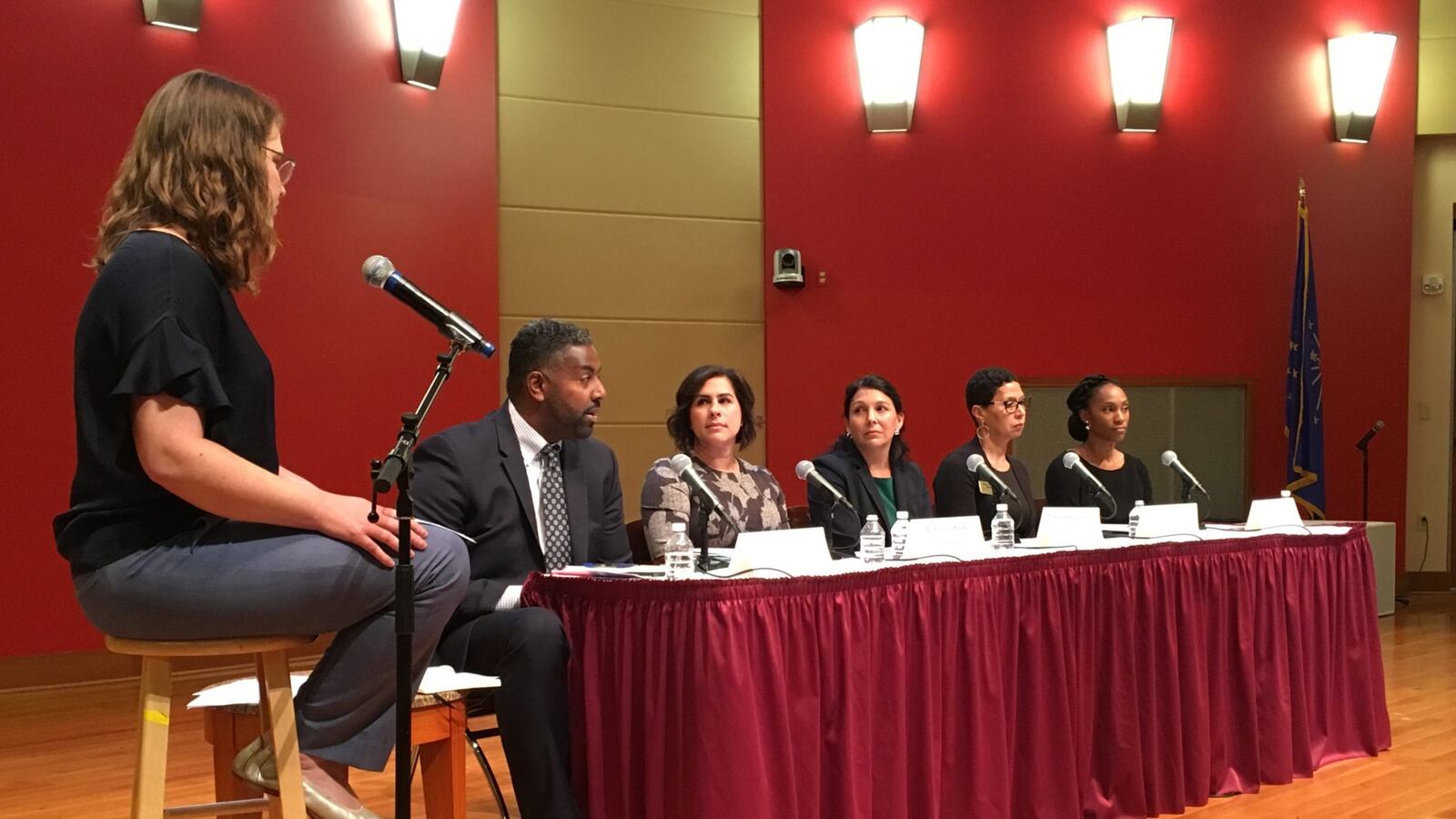In the races for three seats on the Indianapolis Public Schools Board, candidates are sharply split over whether the district is moving in the right direction.
The divisions were clear during a forum Tuesday night hosted by Chalkbeat, the Indianapolis Recorder, WFYI, and the Indianapolis Public Library. Some of the most heated discussions came over the district’s recent decision to close high schools and move to an all-choice high school model, and candidates also clashed over the district’s innovation partnerships with outside operators to run schools — including some where students have struggled the most.
“It’s just disruptive when you just keep changing and changing and changing,” said ceramics studio owner and IPS parent Joanna Krumel, who goes by Jodi, a challenger in the at-large race. “Especially when the district was doing a good job with the programs that they had.”
Retired IPS teacher Susan Collins, who is also running for the at-large seat lamented the closure of high schools that had long legacies in their neighborhoods: “Why do we let our good programs die?” she said.
But at-large incumbent Mary Ann Sullivan defended the district’s decisions, pushing back on the perception that schools have taken a turn for the worse.
“I don’t think we were doing well. I don’t think all was all right with IPS. I think we were patient for too long with strategies that weren’t moving the needle for kids,” said Sullivan, a former Democratic state lawmaker.
Read more: Sort through each school board district race and see candidates’ answers to a Chalkbeat survey
Candidates also debated the district’s low test scores, financial transparency, community engagement, and equity of access to highly sought-after magnet programs.
Often, their disagreements illustrated long-standing rifts between advocates and critics of school choice.
The at-large challengers denounced the district’s partnerships with charter schools, influential charter supporters such as The Mind Trust, and the Indy Chamber on finances and its referendum efforts.
“There is too much incursion by business interests in the education of our children,” Collins said.
Krumel said she didn’t support working so closely with charter schools, either: “I don’t think that charter schools are here to stay. At least I hope they’re not.”
But Sullivan called those “adult battles” over politics that distract from addressing the needs of children.
“I’m just very sad that we still have the same kinds of conversations that take our eyes off the prize of being able to offer every single kid in the city of Indianapolis a great opportunity,” Sullivan said. “I would like to have more conversations about where we’re going, what’s possible — and not a return to something that I don’t think were ever really glory days, especially not for too many of our students of color and students in poverty.”
In the race for the open seat in District 3, which represents the north side, one candidate supported innovation schools while two others expressed concerns.
“I see innovation schools, frankly, as the next generation of the district willing to take risks, to do what it takes to serve our students,” said Evan Hawkins, executive director of facilities and procurement for Marian University and an IPS parent. “Innovations schools are not the panacea, but innovation represents one of those options that the district has … [to] ensure that our schools stay locally controlled.”
But Sherry Shelton said she wanted to support ideas proven to work, and she didn’t believe the innovation schools showed enough positive results.
“I don’t think we should take a chance with our students,” said Shelton, director of information services for Pike Township schools. “I think we should stop the innovation schools, re-evaluate the program, tweak it, and if it’s something that we’re going to move forward with, that we develop a successful process to open those, evaluate, and keep them up to a certain standard.”
Michele Lorbieski, a trial attorney with Frost Brown Todd and an IPS parent, said the innovation schools cause disruption, and said they haven’t shown as much improvement as is often touted.
“I think we need to pump the brakes on these innovation schools,” she said. “We’re doing a pilot to figure out if our high school students should take the IndyGo bus, but we didn’t even pilot the innovation schools. So let’s make sure they’re effective before we keep going down this path at this pace we’re going.”
In the race for District 5, which represents the northwest side of the city, candidate Taria Slack outlined the challenges of teacher turnover that she has seen in the innovation schools that her three children attend.
“I think we need to stop replicating this program until we have better research on what’s really going on,” said Slack, a federal worker. “We need to make sure that our kids are hitting every last one of these benchmarks.”
But incumbent Dorene Rodríguez Hoops, an IPS parent, said families and community members sometimes feel innovation schools are the best fit for their neighborhoods.
“Sometimes the innovation school option is the best option,” she said. “So I see charter schools and innovation schools as part of our educational landscape, part of our toolbox if you will, to look at what’s the best option for our children in a specific neighborhood.”

